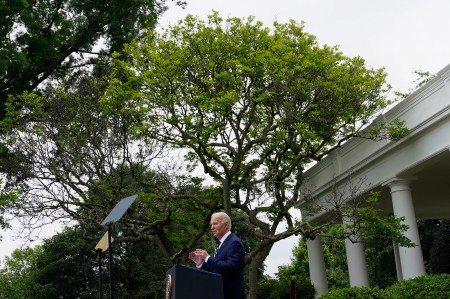(Reuters) -U.S. President Joe Biden on Tuesday unveiled steep tariff increases on an array of Chinese imports, including electric vehicle (EV) batteries, computer chips and medical products.
Following are reactions to the move.
ELISSA PIERCE, RESEARCH ASSOCIATE, WOOD MACKENZIE
“U.S. solar manufacturers are still relatively dependent on China for other module components, such as glass and wafers. While these products are also subject to the Section 301 tariffs, it doesn’t look like the tariff rate on these will be increased.”
“However, there is one important change to the tariff that will benefit U.S. solar manufacturers. President Biden has directed Ambassador Tai to establish an exclusion process for some solar manufacturing equipment. This is something that domestic module producers have been advocating for, because it is difficult to source this machinery from outside of China. This should lower the costs of building solar factories in the U.S.”
MARIUS MORDAL BAKKE, SENIOR ANALYST OF SOLAR SUPPLIER RESEARCH, RYSTAD ENERGY
“The doubling on tariffs from 25% to 50% for microchips in 2025 could spur inverter manufacturers looking to expand in the U.S. to look outside of China for suppliers of these components.”
“A new round of AD/CVD tariffs on the top exporters of solar PV components to the U.S. is likely to have a much larger impact on U.S. prices and company margins than any further duty increases to Chinese solar PV cells and modules.”
ESWAR PRASAD, CORNELL UNIVERSITY TRADE POLICY PROFESSOR AND FORMER IMF CHINA DEPARTMENT HEAD
“Despite the modest volume of imports directly affected, these tariffs clearly draw the battle lines for trade in products that the two countries are pinning their manufacturing sectors’ futures on.”
“It is almost certain that Beijing will hit back against these tariffs with its own measures, although the question is whether these will be calibrated to seem proportional rather than setting off an escalating trade war. Given the high stakes involved, this round of tariffs could ratchet up the trade tensions between the two countries in a way that is difficult to pull back from.”
“Some U.S. industries and manufacturers will experience cost increases and supply-chain disruptions as a result of these tariffs but the Biden administration is clearly taking the view that these will be modest and can be managed.”
UNITED AUTO WORKERS
“The UAW applauds today’s decisive action from the White House on ensuring that the transition to electric vehicles is a just transition. We have warned for many months that, left to the forces of corporate greed, the EV future was threatened by a race to the bottom, from China to Mexico to right here in the United States. Making sure that major corporations have to pay a price for pitting worker against worker, pushing wages lower and lower, is a key part of a pro-worker trade policy. America’s autoworkers, our families, and working class communities across this country want a trade policy that puts workers first. Today’s announcement is a major step in the right direction.”
TOBIN MARCUS, HEAD OF U.S. POLICY AND POLITICS, WOLFE RESEARCH
“Overall we view this as more protective/symbolic than currently disruptive. Chinese overcapacity and subsidized production of products like EVs is rightly seen as a future threat, but current volumes in the highest-risk sectors are very modest … We expect there will be some Chinese response, but that Beijing will aim for proportionality, which means the U.S. fallout should be limited. The U.S. move here may also make it easier for Europe to impose new duties on Chinese EVs, as they are considering.”
JASON OXMAN, PRESIDENT AND CEO OF THE INFORMATION TECHNOLOGY INDUSTRY COUNCIL
“Today’s announcement from the Biden Administration disregards significant stakeholder input and fails to address the top concerns raised by affected industries, including tech. The business community has repeatedly documented how Section 301 tariffs disproportionately harm U.S. businesses, manufacturers, workers, and consumers, and have failed to motivate China’s leaders to change their unfair trade practices. The expansion and significant increase of Section 301 tariffs will continue to strain Americans’ wallets, exacerbate the effects of global inflation by raising the price of goods, and harm U.S. global leadership.”
BRIAN BRYANT, INTERNATIONAL PRESIDENT OF THE 600,000-MEMBER INTERNATIONAL ASSOCIATION OF MACHINISTS AND AEROSPACE WORKERS
“As International President of one of the largest manufacturing unions in North America, I’ve seen first-hand the negative impacts of the Chinese government’s anti-competitive trade practices, such as dumping heavily subsidized imports … The IAM has been a leader over the years in sounding the alarm on unfair trade practices that cost North American jobs. Tariffs aren’t an end goal but a very important tool to end trade practices that kill good American jobs and drive down American pay.”
MIKE CARR, EXECUTIVE DIRECTOR, SOLAR ENERGY MANUFACTURERS FOR AMERICA COALITION
“The Administration made the right decision to strengthen protections for solar components we seek to build in the U.S. While no one action can unwind the years of a concerted effort to dominate this industry, including in manufacturing equipment and heavily subsidized production by Chinese-headquartered firms in Southeast Asia, we are encouraged by this indication of the Biden administration’s commitment to use all the tools at their disposal in a targeted and strategic way.”
(Reporting by Reuters Staff; Editing by David Gaffen, Matthew Lewis and Shounak Dasgupta)


